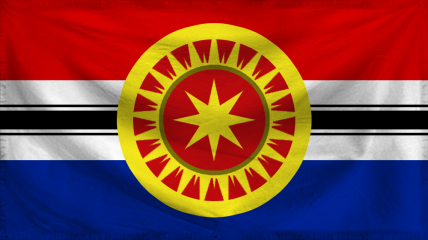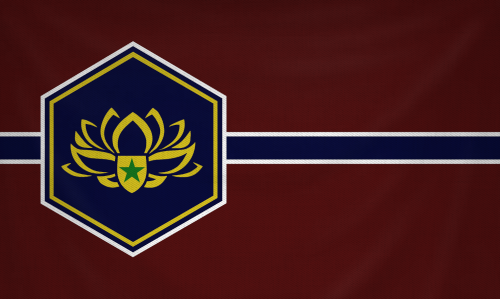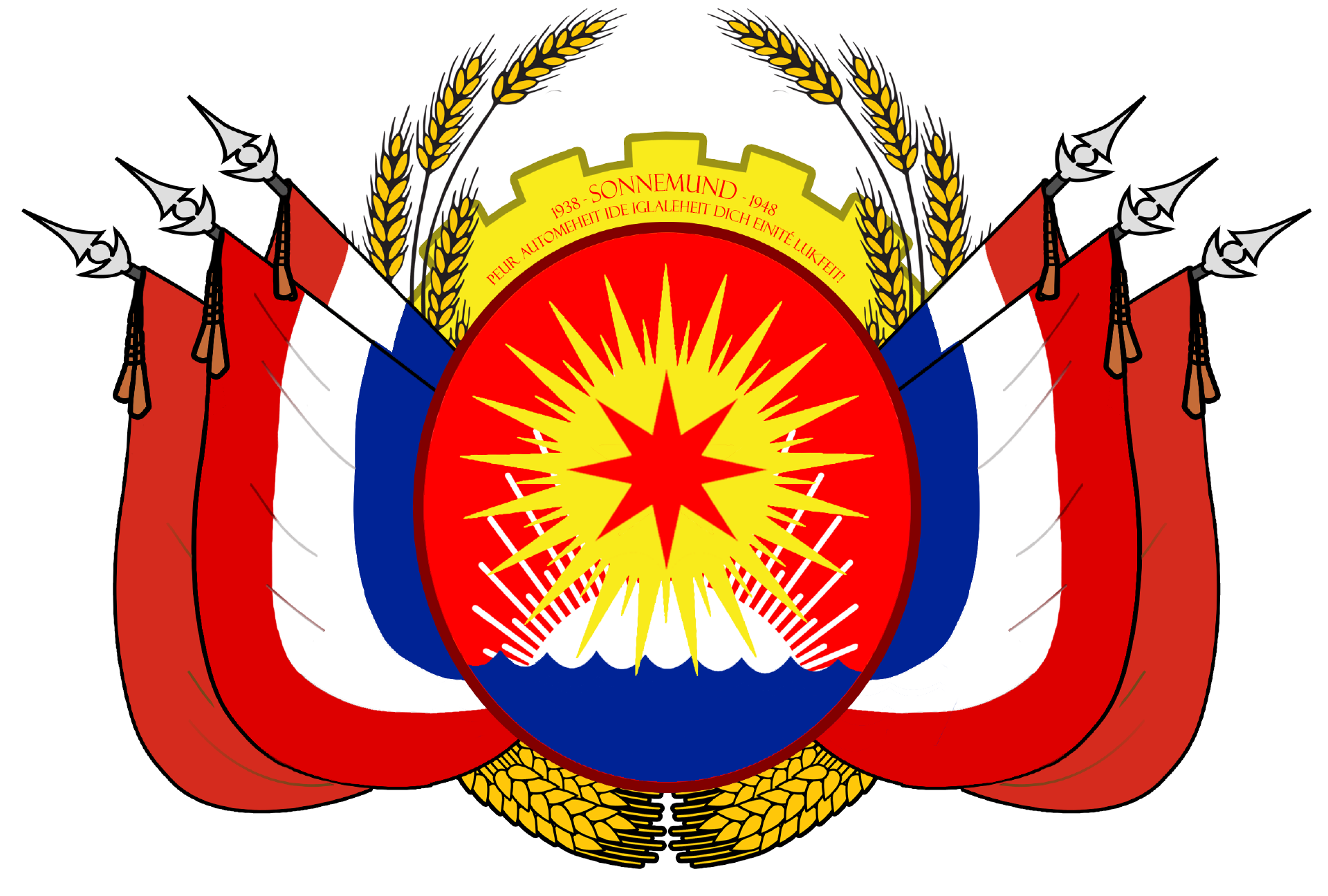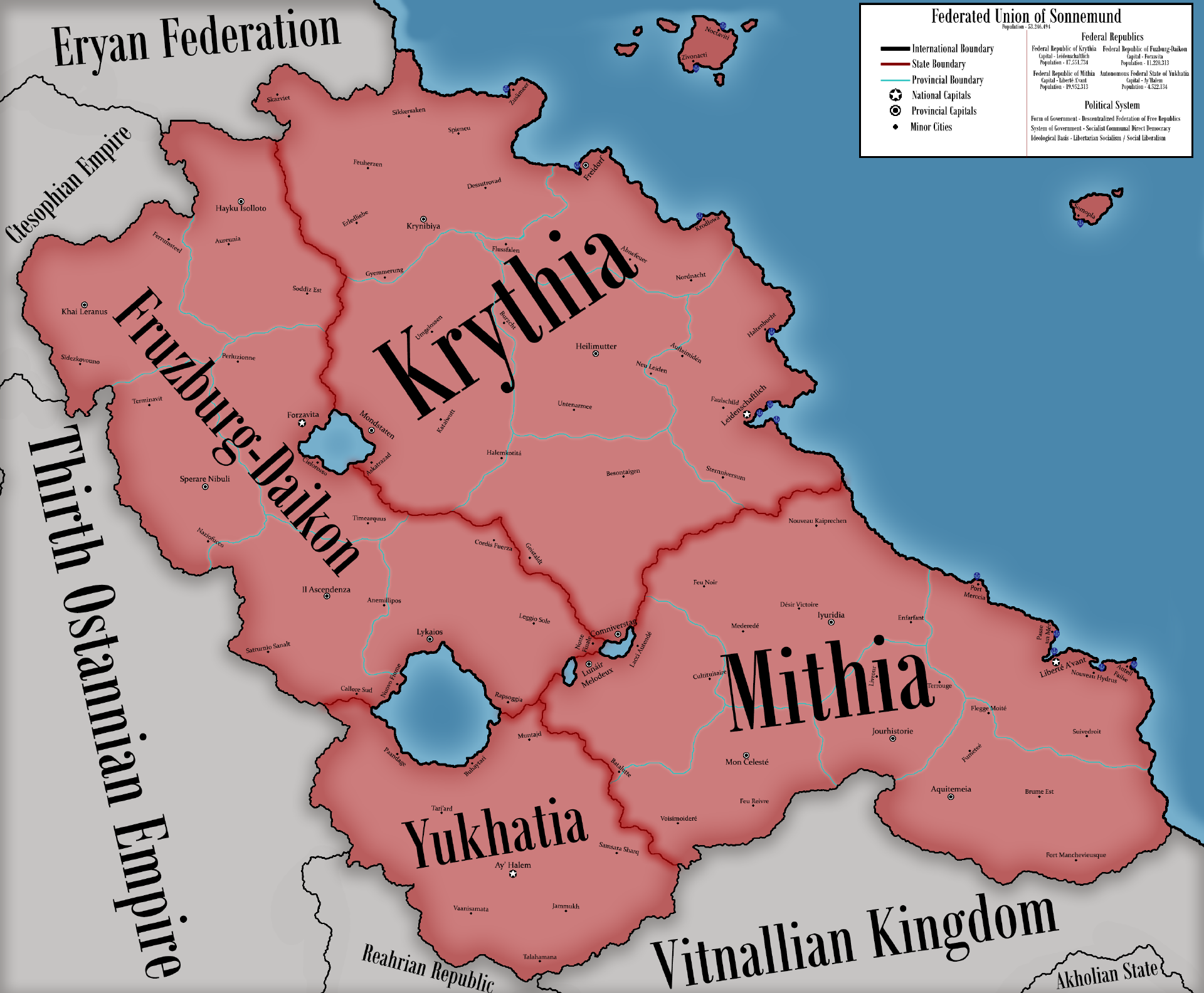| National Factbook |
| Flag: |

|
| Nation Name: |
Sonnemund |
| Leader Name: |
Otto di Kasa |
| Currency: |

Swiss Franc |
| National Animal: |

Marmot |
| History: |
The first people who inhabited Sonnemund appeared at about 23.000 B.C., with the Proto-Heykellian Culture being the dominant culture, reaching an apex during the Heykellian-Sevellian Expansion. This expansion ended after the Sazhuran Transformation, who resulted in centralized kingdoms and duchies who would eventually form the Confederation of Yondi'Holam, who would end after the Great Northwestern War and the Strahatarian Invasion. During most of the Great Yondi'Holam Conflictual Age (1324-1791), the region today called Sonnemund was a battleground between numerous minor nobles, barons and counts trying to excert control in the area, trying to dominate the rich mineral regions of the Affrounhaut, the trading areas of Gutsiesch that create commercial ties to the mainland Astelat region and the prosperous farming area of Haybrunch, turning Sonnemund into a rich and strategical position, being target of invasion from some major powers coming from external regions, like the short dominions of the Suaschuzky Kingdom, forming the Province of Sayzhaham (New Territories West) and the Fouzhay Dominium. Those nobles, when receiving external or internal power, would give birth to some of the most famous dynasties in this epoch, like the Haysudia, Ikydlia, Horleany, Fayham, Outznobisch and Andschuflitch dynasties. The major states that ascended after the Yondi'Holam age in this area were the Kingdom of Krythia, the Grand-Duchy of Fruzburg, the Duchy of Daikon and the First Republic of Mithia. This situation changed after the Krythian Conquests (1801-1823), where the Krythian royal line (formed form a marriage between the Outznobisch and Andschuflitch dynasties) unified the central regions of Affronhaut, Gutsiesch and parts of Haybrunch into a unified country called the Krythian Empire. During this time, the Krythian Empire tried to create a national identity based on the cultural and religious similarities between the conquered states around the concept of "Sonnemund", but even with those attempts, terrorists and national movements for separation and independence flourished, culminating in the famous May'Haim Rebellion in 1871 that was almost able to conquer the capital of Leidenschaftlich and led to the annihilation of nobles in the interior of the Krythian Empire. This empire would see it's end after a war (1910-1931) for the dominance of the Haybrunch Plains against the Second Ostannian Empire. Even though the Krythians managed to win the war with the help of the Second Republic of Mithia and was able to conquer the Yukhatians that lived in the Haybrunch Province dominated by the Ostannians, this war desistabilized the empire, already weak from the May'Haim Rebellion, leading to a social-economical crisis and the subsequent Krythian Collapse, resulting in the establishment of several minor states waging wars in the General Civil War of the Three Regions. The estabilishment of the Treaty of Sonnemund in 1938, trying to estabilize the entire region, was another failure, resulting in the Second Sonnemundiam Civil War in 1940. After six years of civil war, the Sonnemundian Front of Liberty, Equality and Communality (SFLEC) won the war against the Nationalist Krythian Front (NKF), the New Royalist Army (NRA) and the Communist Front of Sonnemundian Liberation (CFSL). After this civil war, the country was reinstated as a federalist descentralized country with a direct democratic system and with socialist policies. Inside the Federated Union of Sonnemund there are today three main parties, the Kásans (KLP), who defends a social-liberal federative republican democracy, the Alánius (APL), who defends a socialist libertarian state and the Kriggia (KCP) who want a paternal semi-religious state. Inside the federal states there are also right-wing identitarian groups, like the Mithian Identity Party (MIP), the Fuz-Dai Identity Party (FDIP) and the most famous, the Krythian National Party (KNP), wanting a end to the federal system. Even after 60 years of integration, the Yukhatian regions aren't exempt from conflicts too, with the terrorits groups of the National Front for Yukhatian Liberation (NFYL) formed by ultranationalist yukhatians and the Confederation for Yukhatian Freedom (CYF) formed by left-wingers attacking Sonnemundians to this day. |
| Geography |
| Continent: |
Europe |
| Land Area: |
113,458.47 sq. km |
| Terrain: |
The Federated Union of Sonnemund has three main geographical regions, those being the Affronhaut Mountains, the Gutsiech Plateou and the Haybrunch Plains.
The Affronhaut Mountains, home of Fruzburg-Daikon, is famous for it's mineral riches, ski resorts and wonderful sceneries. Most of the rivers that form the fertile plains down west are formed here, with the nascents of the Plaitunnuch, Neufein, Ayrakare and Utinica rivers located in those mountains. The average altitute of the mountais is of 1,640 metres, and the tallest point in the entire Sonnemund being the Dekharium Mount with 4322 meters. Lots of people come here to climb the giant mountains that form Affronhaut.
The Gutsiech Plateou forms the core of the nation, with the Federal Republic of Krythia, the most populous region, being located here. The plateou is famous for it's enormous quantity of lakes, waterfalls and rivers, with the bigger cities being formed around those places.
The Haybrunch Plains was the last place to be integrated to the Federal Union of Sonnemund, and is famous for it's pecuary and agricultural industries and it's calm culture and scenery. This region is certainly the most fertile and is dominated by a great quantity of small owners of farms that makes the interior of this region prosperous. |
| Highest Peak: |
Mt. Dekharium,
4,322 meters
|
| Lowest Valley: |
Adzhazkha Lake,
-55 meters
|
| Climate: |
|
| People & Society |
| Population: |
4,411,960 people |
| Demonym: |
Sonnemundean |
| Demonym Plural: |
Sonnemundeans |
| Ethnic Groups: |
Mithian - 37.4%
Krythian - 32.9%
Fuzburgian-Daikonese - 21.0% |
| Languages: |
Sonnemundian - 91.5%
Yukhatian - 8.4% |
| Religions: |
Süzenschlat - 33.9%
Moundeifon - 31.4%
Yubiume Al'Talim - 6.4% |
| Health |
| Life Expectancy: |
83 years |
| Obesity: |
13.7% |
| Alcohol Users: |
81.2% |
| Tobacco Users: |
27.1% |
| Cannabis Users: |
7.1% |
| Hard Drug Users: |
3.1% |
| Economy |
| Description: |
The economy of Sonnemund is prosperous and developed, being one of the founders members of the Northern Astelat Common-Market for Economical Development (NAC-MED) and having one of the biggest GDPs per capita in the entire world, possessing one of the lowest inequalities in the world. Sonnemund economy is also very globalised, with Freidorf, Leidenschaftlich and Liberté A'vant dockyards exporting several resources to the outside world. Trade in-land however is difficult considering the bad relations with Ostannia and Ctesophia.
Sonnemund has a GDP of $3.18 trillion, having a economy formed by three main axis of economy, those being mineral extraction, agricultural production and industrial manufacturing. The mineral extraction mostly happen at the Affronhaut Mountains, with a minor part being at the Gutsiech Plateou. There, it is mined lead, coal, iron, copper, nickel and gold, with Haykzu Isolotto and Sperare Nibuli being the capitals of mining in the country and Khai Leranus being considered the gold capital of Sonnemund.
The agricultural production is centered at the Haybrunch Plains, where the ferile lands around the Plaitunnuch and Iyutinica rivers are used for farming and pecuary. A lot of crops like corn, potatoes, apples, olives, wheat, grapes, oats and ryes are produced in this region, with the regional states of Rivicoursés and Communatile being considered the breadbasket of Sonnemund. In the pecuary sector, cows, chickens and pigs forms the basis for this part of the economy, with dairy products being heavily produced in the regions of Iyuridia and Jourhistorie.
The manufactured production is mainly concentrated on the heavy populated cities of the Sonnemundian coast and the Gutsiech Plateou. Factories producing steel, industrialized food, airplanes, cars, munitions, textiles, chemicals, electronics and pharmaceticals are scattered around the heavily industrialized axis of Leidenschaftlich-Heilimutter-Freidorf and the cities of Mondstadt, Forzavita and Liberté A'vant. Several companies were created and developed in this region, with the some of the most known ones being the Fuzdai Airplanes, Krythian Steel, SFMS (Sonnemundian Federal Military Company), Tesiwebe, Sonnetrak, Comein Mithia Cissen, Est Schivres Dockyards and Klázhius.
Sonnemund works under mixed economy system, with a series of different economical systems depending on where you are. Most of the Mithian interior is controlled by self-managed collective farms, while the factories of Mithia are under a worker-controlled industrial system following the principles of socialism. Fuzburg-Daikon mines are controlled by the National Syndicate of Miners but most of the cities follow a capitalist free-market system. In Krythia, the coastal regions work under a liberal free-market system, however a good portion of factories are state-owned and the continental parts usually follow mixtures of all systems presented. |
| Average Yearly Income: |
$46.18 |
| Gross Domestic Product (GDP): |
$5,578,923,634.00 |
| GDP per Capita: |
$1,264.50 |
| Gross National Income (GNI): |
$3,988,017,375.00 |
| Industries: |
The economy of Sonnemund is formed by three production axis: mineral extraction, agricultural production and manufacturies. Most of the mineral extraction happens at the Affronhaut Mountains, with a minor part being at the Gutsiech Plateou. There, it is mined lead, coal, iron, copper, nickel and gold. The agricultural production is centered at the Haybrunch Plains, where fertile lands around the Plaitunnuch and Utinica rivers are used for farming and pecuary. A lot of crops like corn, potatoes, apples, olives, wheat, grapes, oats and ryes being produced. In the pecuary sector, cows, chicken and pigs forms the basis for this part of the economy, with dairy products being heavily produced in the interior.
The manufactured production is almost entirely focused in the heavy populated cities localized at the Gutsiech Plateou and the worker centers of Krythia, with food processors, steel, cars, airplanes, munitions, textiles, chemicals, electronics and pharmaceuticals being heavily produced. |
| Military |
| History: |
|
| Soldiers: |
0 |
| Tanks: |
0 |
| Aircraft: |
450 |
| Ships: |
0 |
| Missiles: |
0 |
| Nuclear Weapons: |
0 |
| Last Updated: 10/12/2023 05:50 am |

























